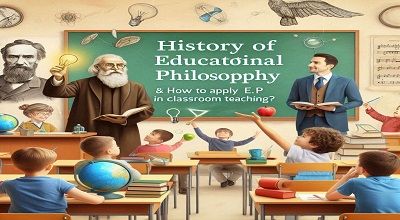History Of Educational Philosophy
The history of educational philosophy is a fascinating and rich topic that spans from ancient times to the present day. It explores the nature, aims, and problems of education, as well as the philosophical issues that arise from educational practice. Here are some web sources that can help you learn more about this subject:
[Philosophy of education | History, Problems, Issues, & Tasks]: This article from Britannica provides an overview of the main historical figures and contemporary approaches in the philosophy of education. It covers topics such as the Socratic method, the role of reason, the nature of knowledge, the aims of education, and the ethical and political implications of education.
[Philosophy of Education, History of]: This entry from Encyclopedia.com traces the development of the philosophy of education from ancient Greece to modern times. It highlights the contributions of philosophers such as Plato, Aristotle, Augustine, Aquinas, Locke, Rousseau, Kant, Hegel, Dewey, and Freire.
[Education, history of philosophy of]: This article from the Routledge Encyclopedia of Philosophy focuses on the history of the philosophy of education in Western civilization. It examines the educational theories of Plato and Aristotle, as well as the medieval, Renaissance, Enlightenment, and modern periods. It also discusses some key themes and problems in the philosophy of education, such as justice, democracy, freedom, and equality.
[Philosophy of education]: This article from Wikipedia gives a general introduction to the philosophy of education. It defines the scope and methods of the field and surveys some of the main branches and schools of thought in the philosophy of education. It also lists some influential philosophers and educators who have shaped the field.
How To Apply Educational Philosophy In Classroom Teaching?
Applying educational philosophy in classroom teaching is a way of reflecting on your beliefs and practices as a teacher, and aligning them with the goals and values of education. There are different types of educational philosophies that can guide your teaching, such as:
Perennialism: This philosophy emphasizes the importance of teaching the enduring ideas and principles of human civilization, such as logic, ethics, aesthetics, and metaphysics. Perennialists believe that students should learn through reading the great books of the Western canon and engaging in rational dialogue and critical thinking. Perennialists also value the development of moral character and intellectual virtues in students.
Essentialism: This philosophy focuses on teaching the essential skills and knowledge that students need to succeed in the modern world. Such as reading, writing, mathematics, science, history, and foreign languages. Essentialists believe that students should learn through a rigorous and structured curriculum that is based on academic standards and core subjects. Essentialists also emphasize the role of the teacher as an authority figure and a transmitter of knowledge.
Progressivism: This philosophy stresses the importance of teaching students how to think for themselves, solve problems, and adapt to changing situations. Progressivists believe that students should learn through active involvement in real-world projects and experiences that are relevant to their interests and needs. Progressivists also value the development of social skills and democratic values in students.
Reconstructionism: This philosophy advocates for teaching students how to critically examine and transform the social, political, and economic structures of society. Reconstructionists believe that students should learn through participating in social action and civic engagement that address the issues and challenges of their communities and the world. Reconstructionists also emphasize the role of the teacher as a facilitator and a change agent.
Last Words
To apply educational philosophy in classroom teaching, you need to first identify your own beliefs and goals as a teacher, and then select the philosophy or philosophies that best match them. You can also combine elements from different philosophies to create your own unique approach. Then, you need to design your curriculum, instruction, assessment, and classroom management strategies according to your chosen philosophy or philosophies. You can also seek feedback from your students, colleagues, and mentors to evaluate and improve your teaching practice.
